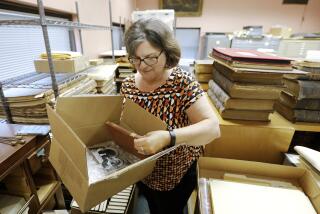Now at Harvard: Samuel Johnson
- Share via
CAMBRIDGE, Mass. — For Mary Hyde Eccles, literary giant Samuel Johnson was more than a ghost of history. He was a passion.
The Viscountess Eccles, a scholar and renowned book collector, spent 60 years acquiring works owned by or written by or about the 18th century English critic, biographer and essayist, who was regarded as one of the greatest public figures of his era.
She started the collection with her first husband, lawyer Donald Hyde. It included letters between Johnson and his closest friends, volumes from his library, manuscripts, first editions of his works, original portraits of Johnson and his contemporaries, even his silver teapot.
The Donald and Mary Hyde Collection of Dr. Samuel Johnson is now at Harvard’s Houghton Library. In about two years, after it is cataloged, it will be available to students, professors at Harvard and visiting researchers.
Johnson is best known for assembling the first modern English dictionary and as the subject of James Boswell’s famous biography. He remains a popular and often-quoted figure in English literature, partly because he overcame obstacles including poor health, poverty and depression to achieve greatness.
Harvard scholars and librarians say the Hyde collection’s 4,000 volumes, letters, paintings and objects are a direct connection to the lives of Johnson and his contemporaries.
James Engell, an English literature professor at Harvard, said the manuscripts and handwritten notes in the margins of books offer insight not available elsewhere.
“The ... past isn’t filtered through other readers,” Engell said. “You can occasionally find out things from the manuscripts that you wouldn’t know.”
In particular, the early proofs of works in the collection -- such as drafts of his “Plan for a Dictionary” and the printers’ proofs of Boswell’s “Life of Johnson,” corrected in his own hand -- offer a direct connection to authors’ decision-making processes.
They “are not simply the preexisting copy,” Engell said. “It holds a set of decisions [with] their own story to tell.”
Johnson is the central literary figure of his day, said Leslie Morris, curator of manuscripts at Harvard. “Everything revolved around him -- which is why this collection of Samuel Johnson is so central to study of 18th century literature.”
His writings -- some of them personal, some published -- offer a window into that world, said William P. Stoneman, librarian at the Houghton Library.
“He’s a man who expresses himself clearly and succinctly -- he gives the equivalent of modern sound bites,” Stoneman said. “He touches on all aspects of 18th century English life.”
Lady Eccles, a native of Michigan whose family had roots in New Bedford, Mass., had an early interest in Elizabethan theater and earned a doctorate from Columbia University.
She and Hyde began their Johnson collection in earnest in the 1940s, acquiring a major group of manuscripts in 1948. Over the years, she wrote several books about Johnson and his friends.
After Donald Hyde died in 1966, Mary Hyde honored his memory by pledging to donate their collection to the Houghton Library, designing a space for the collection on its third floor. She continued collecting and writing, with further encouragement from her second husband, David, the Viscount Eccles, whom she married in 1984. Lord Eccles, himself a literary collector, was a British government official and former chairman of the board of the British Library. He died in 1999.
Lady Eccles died last August at 91, setting in motion the gift she had pledged to Harvard.
While it will take months to prepare the collection for public access, it is in excellent condition, having been stored at Lady Eccles’ own personal library at Four Oaks Farm, her estate in New Jersey.
“One of the things Mary understood is if you own this material, you have a responsibility to maintain it to the best of your ability,” Stoneman said.
“She had a very sophisticated outlook toward collecting,” added Eric Holzenberg, librarian of New York’s Grolier Club of book enthusiasts. Lady Eccles was among the club’s first female members, admitted in 1976.
“She appreciated the necessity of having things in original condition, of buying entire small subcollections to preserve relationships,” Holzenberg said.
The Houghton Library features a collection of 500,000 volumes, dating back as far as the 15th century, and a collection of 10 million manuscripts.
More to Read
Sign up for our Book Club newsletter
Get the latest news, events and more from the Los Angeles Times Book Club, and help us get L.A. reading and talking.
You may occasionally receive promotional content from the Los Angeles Times.










